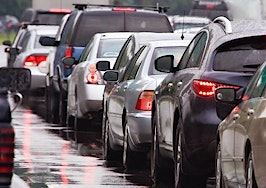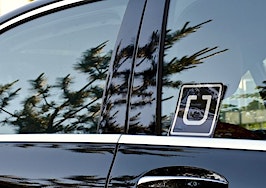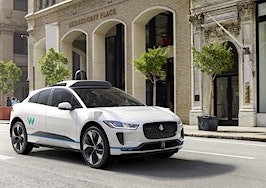As ride-hailing apps like Uber and Lyft skyrocket in popularity, city streets are becoming more — not less — congested, according to a new study that calls into question claims that a spike in livery vehicles would eventually reduce traffic by convincing drivers to abandon their own cars.
Schaller Consulting, a Brooklyn-based urban transportation policy firm, found that rather than clear up clogged streets, as executives for Uber have claimed, ride-hailing options have inordinately drawn city dwellers who would otherwise be riding bikes or taking buses and trains.
“They’re not generally competitive with personal autos on the core mode-choice drivers of speed, convenience or comfort,” wrote Bruce Schaller, founder of Schaller Consulting, adding that those who own cars use ride-hailing apps to avoid parking or drunk driving. “They’ve added billions of miles of driving in the nation’s largest metro areas at the same time car ownership grew more rapidly than the population.”
In the US, ride-sharing companies carried 2.61 billion passengers in 2017, 37 percent more than the 1.9 billion they escorted in 2016. In total, ride-hailing companies added 5.7 billion additional driving miles to city streets, with 70 percent of all trips taking place in nine large cities.
Among those who use services like Uber, 60 percent would have otherwise taken public transportation, biked or walked, further contradicting claims that city dwellers would eventually abandoning individual cars en masse. Ride-sharing companies and taxis are expected to unseat public transportation as the most popular mode of transportation by 2019, according to the study.
Even ride-sharing options such as UberPOOL and Lyft Shared Rides add to traffic-congested roads. In total, those car-pooling options added 2.6 new miles on the road for every mile of individual driving, in total increasing traffic on the road by 160 percent, according to the study.
“Pooled ride services have lured a different market that directly competes with subway and bus systems, while failing to achieve significantly better efficiency than their solo alternatives,” Schaller said. “The result: more driving overall.”
In an op-ed Friday on the website CityLab, Robin Chase, the co-founder and former CEO of Zipcar, rebuked the Schaller Consulting study, arguing that streets had been congested and public transportation underutilized for decades before Uber launched its first fleet of cars in 2009.
“What I learned from Zipcar is that when people give up their personal vehicle and have to start paying full costs each time they use a car, they will start to choose to walk, bike, and ride transit a whole lot more,” wrote Chase. “In cities with great public transit networks, ride-hailing has encouraged some people to give up their own car. These new economics have surely come into play for them as well.”





